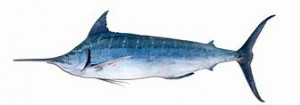NCF seeks protection of marine lives as man kills $2m Blue Marlin in Delta
Posted on 22/03/2021 9:29 AM | by NaijaHouses

To prevent marine livesfrom going into extinction, the Nigerian Conservation Foundation (NCF) has restated the need for Nigerians to protect biodiversity in the country.
The group expressed concern over unacceptable behavior to such animals, stressing that more education and awareness is needed on the importance of marine lives in the ecosystem.
The Director General of the foundation, Dr. Muhtari Aminu-Kano, who reacted to a recent video about a man in Warri, Delta State, who caught and killed a Blue Marlin with an estimated value of $2 million during a fishing expedition. It was reported that the fisherman killed and shared the flesh with his family and community members.
Aminu-Kano described the action as bad towards biodiversity, especially for creatures that are endangered and most suitable for research and environmental education.
The DG said the incident highlights the need for more awareness campaigns and education to coastal dwellers on the importance of these species and their responsibility in protecting marine creatures.
The Blue Marlin is currently classified as vulnerable on the IUCN Conservation status (Red List), meaning that the population is decreasing at an alarming rate.
He said, “We are saddened by the destructive practices along the coastline including pollution and, in this case, unsustainable harvest of marine creatures. These and other reasons made NCF to organise a Marine Stakeholders’ Workshop in collaboration with the Rivers State University (RSU) two years ago to create more awareness and find lasting solution to these challenges.
NCF appealed to the public to see biodiversity protection as everyone’s responsibility as its loss will lead to an uninhabitable earth for man.
Aminu-Kano added, “Marine biodiversity a needs to be protected by communities to halt the killing of these species, which leads to their decline and eventual extinction.
“We call on of all coastal states and other Nigerians to rise to the challenge of promoting environmental education in Nigeria.”
SOURCE: Guardian.ng